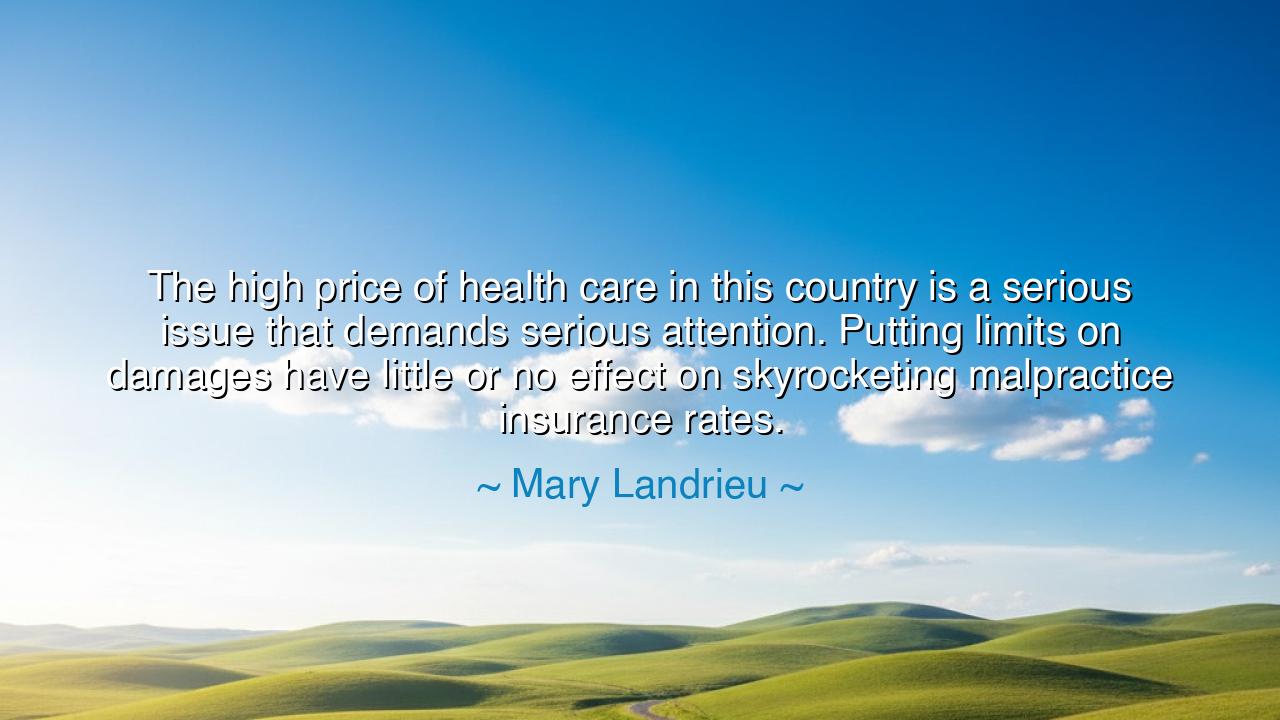
The high price of health care in this country is a serious issue
The high price of health care in this country is a serious issue that demands serious attention. Putting limits on damages have little or no effect on skyrocketing malpractice insurance rates.






In the words of Mary Landrieu, we hear the sober voice of reason rising from the chaos of modern civilization: “The high price of health care in this country is a serious issue that demands serious attention. Putting limits on damages have little or no effect on skyrocketing malpractice insurance rates.” These words, though spoken in the halls of government, carry the weight of ancient truth — that a society’s worth is measured not by its wealth, but by how it tends to the sick, the weak, and the weary. For when the care of the body becomes a burden too heavy for the people to bear, the soul of the nation begins to sicken with it.
Since the dawn of medicine, healers have walked a sacred path between service and survival. In the temples of Asclepius, the Greeks once believed that healing was not merely a craft but a covenant — a divine trust between physician and patient. Yet as the centuries passed, and gold began to weigh heavier than compassion, the act of healing became entangled in the machinery of commerce. Landrieu’s words emerge from this modern dilemma — where health care, once a human right born of empathy, has become a marketplace of suffering, governed not by conscience but by cost. Her warning is clear: that the sickness of the system cannot be cured by superficial remedies, for it is the heart, not the hand, that is diseased.
The high price of health care, she says, is not a distant abstraction but a wound that bleeds through every home and every family. It is the mother choosing between medicine and rent, the father working three jobs to pay for a single surgery, the elder forced to ration pills that once promised relief. Such stories echo across the land like laments of the forgotten. Yet too often, those in power reach for easy solutions — to limit damages, to place a ceiling on what justice may grant to those wronged by negligence. But as Landrieu wisely declares, such measures are shadows masquerading as substance. They treat the symptom, not the cause.
Indeed, the malpractice insurance rates that rise like relentless tides are not born merely of lawsuits or greed, but of a deeper imbalance — a system that values profit over prevention, defense over trust. To cap damages is to silence the cry of the injured while leaving untouched the machinery that created the harm. It is as if one were to patch a leaking roof with paper and call the storm subdued. Landrieu’s insight is thus not an argument of economics alone, but of ethics, of justice, and of the sacred duty owed by healers and lawmakers alike to those they serve.
Consider the story of Florence Nightingale, who walked among the wounded soldiers of the Crimean War. She found not only shattered bodies, but a system of care rotting with inefficiency and indifference. She did not seek to silence complaints or hide the stench of failure — she sought reform. She cleaned the wards, trained nurses, and demanded accountability from the powerful. In doing so, she transformed the very meaning of medicine. Landrieu’s call, though cast in the language of policy, follows that same lineage of courage: the belief that true healing begins not in denial, but in honest reckoning.
Thus, her words carry a lesson for all who would lead — that serious issues demand serious attention, not half-hearted gestures. The price of health care will not fall by wishing it so, nor by binding the hands of the wounded who seek justice. It will fall only when compassion outweighs greed, when prevention is prized over profit, when the healer’s oath is honored not in speech but in structure. The reform that is needed is not of limits, but of vision — a restructuring of the system to serve life rather than ledger.
And so, let us take this teaching into our hearts. When faced with the cries of the afflicted, do not offer them shallow remedies or legal ceilings, but seek the deeper cure. Question systems that profit from pain. Support those who bring truth to light. Demand leaders who value people over policy. For the health of a nation is not found in its hospitals or its insurance markets, but in its will to care — to see each citizen as sacred, and each life as worth the full measure of compassion. In this, Mary Landrieu speaks not as a senator, but as a prophet of justice — reminding us that the true cost of care is not measured in money, but in mercy.






AAdministratorAdministrator
Welcome, honored guests. Please leave a comment, we will respond soon